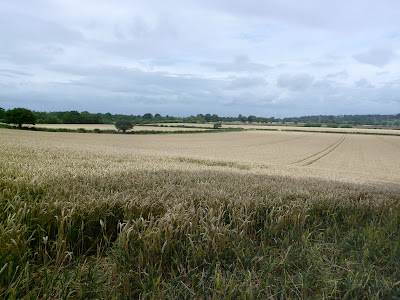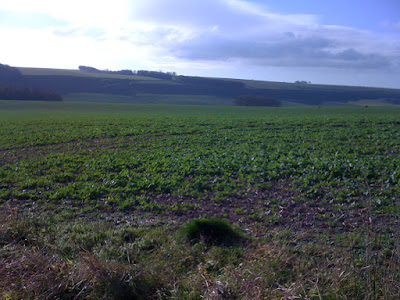Wiltshire - feeding the world. But please read the lable
Down below our greensand ridge today, the wheat smells almost ready to harvest, a smell that takes me back to childhood. Crushed where deer have slept, there is a nutty, floury dry sweetness in the air despite the breeze. On the other side of the track the cattle rush to greet me: it is rare to see anybody down here, so they assume something good is going to happen, such as extra food or a salt lick. This is how we should treat our livestock, out in herds on fresh grass. Too often cattle are kept cooped up in megabarns, a miserable life just so that we can eat cheaply.
Cheap? Cheap food might just cost us the earth. Too many people eating too much, relying on antibiotics to keep crowded livestock healthy. There are genuine concerns that antibiotic resistance is on the way, which will mean more than just the end to cheap meat. It would mean an end to many operations and some chemotherapies for human beings.
Yet our local butchers, R Douse & son are no more expensive than supermarkets despite selling wonderful beef that they rear themselves. I have no qualms about eating animals that have been reared by famers who love and care for their livestock. In the BSE debacle I saw grown men who wonder why people cry at the end of Love Actually break down uncontrollably when told their animals had to be culled. Most suffered no financial loss, just the destruction of their animals and a way of life they loved.
Ditto cheap bread. The intensive farming of wheat means the fields have no insects or the birds that feed on them. Remember all the insects that used to accumulate on windscreens? Gone, and so have the birds that fed on them. Most crops are pollinated by insects, and if they go so will the food. It doesn't have to be like this, as proved by the wonderful book The Running Hare.
And then we compound the sin by expecting cheap food to last for ages. I make bread with flour, water, yeast and salt. If you have a food mixer it's easy, but the bread only lasts a few days. So blitz it into breadcrumbs, put in an airtight container and it's brilliant for any number of recipes. I looked at the label on a very famous "good" sliced loaf this morning: 17 ingredients, most of them meaningless if you're not studying A-level chemistry. The way commercially made bread is risen (ie as quickly as possible) also gives some people IBS and bloating.
So shop with forethought, and remember that we spend a smaller proportion of our income on food than at any time in history. And that "cheap" food might prove to be very expensive in the end.




Comments
Post a Comment